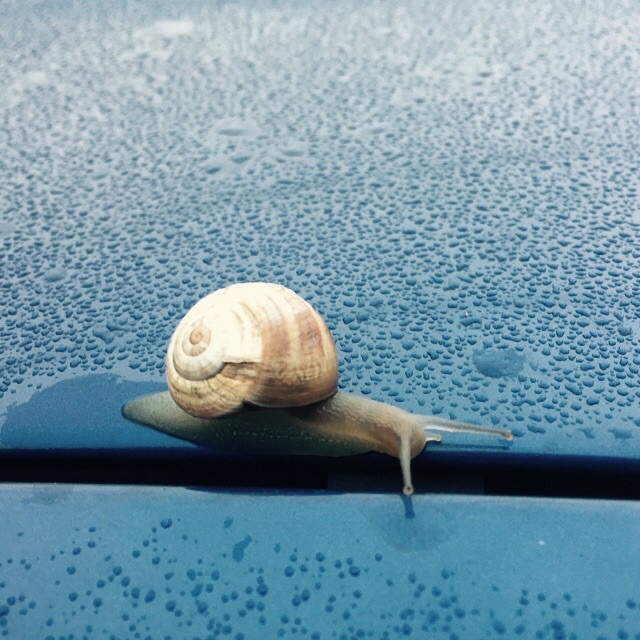Stepping on Snails
I was in my driveway, just outside of my garage where the stains of oil painted the concrete, when I placed my foot down with the firm determination of confidence—a confidence that my foot would meet an equally firm driveway without incident. Instead, I was greeted with a crisp, yet light, crunch underfoot and I knew immediately that I’d obliterated the snail.
A mere moment later, in another instance of immediacy, I came to understand what was meant when people, moved to their most intense and impassioned heights of emotion, would rave:
“I will crush you!”
or
“I will crush the life from you!”
or
“I have always had a crush on you <3”
But I felt no rage of emotion, no fury of feelings, only a mild flavor of sadness. Not quite the sorrow that came with the realization that, despite my best efforts in agility and grace, I was a clumsy beast who hurt others unwittingly. That was just a condition for living—sharing existential time and space—with lesser beings which were sometimes only diminutive of wit and mind, like beasts of burden, and other times physically smaller and more at risk of destruction. My interaction with the snail was the latter, and with a single ruinous step, I knew what Mary Shelley knew when she gave life to Frankenstein’s monster. She wasn’t just the frustrated beard to an articulate (dare I say, poetic?) monster created differently and without consent, but I think we shared the mild sadness of accidently causing inevitable, assured destruction.
The inevitability here in this “suburban tragedy” (redundant, I know), was that an obliterating end came to a snail who deigned to crawl shoulder-to-shell on the paths of men. A snail who moves in the middle of these frenzied roads, especially with the speed as snails are wont to move, and specifically tonight among my frenetic activity, must understand. While we, the powers that be, can (and should) try our best to accommodate and cater to a snail’s vulnerabilities and shortcomings as they pertain to our self-constructed world of friendly definitions and structure, ultimately we cannot be held responsible for the occupational hazards inherent in striving for growth amongst a class of giants greater than yourself.
In fact, if there is not a more glorifying and rewarding life than one that has emerged from the noble (and even, perhaps, ignoble) pursuits that put it at risk, if no other experiential knowledge or understanding can compete and be so sure of its right to exist, then wasn’t my completely erasing all but the most microscopic evidence of this snail’s existence doing exactly what I should be doing in that regard? It seems to me that I gave the snail great honor in respecting its pursuit; I gave it an honest death in the same way it’s experience with a man at the back threshold of his home would have been an honest experience should he have survived the privilege.
Upon hearing the sharp staccato of the progressive crunch under my boot as I stepped backwards toe-to-heel, I looked down. What was once a hardened shell, a cold rock which spiraled like the melded horn of a ram, was now a mass of irregular pieces no more deliberate than the randomized remains of a dropped hand mirror. The gelatinous body of the snail, the dark snot-green color associated with its insides and locomotive residue, was now nothing. No color or mass or anything resembling the remains of something that was once physical in the third dimension, but only a greasy, wet stain of fluid on the concrete, as if a water balloon had been dropped and the rubber casing had dissolved into the concrete with the water molecules. My mind wandered to whether the greasy stain on the bottom of my shoe would track into my carpeted home.
My daughter came out one last time to see the snail she knew as a friend, and when she asked after her plaything, I lied:
“The snail went off into the grass, into nature, as it must. Alive in the great grass clearings or reposed in the wooden forests or, at best, enclosed in a suburban garden, this is where the snail belongs and excels. This is the natural way, you see.”
I didn’t lie out of guilt for killing the snail.
I didn’t lie because I had been wrong; after all it was an accident and I was assured accidents happen when snails undertake high-risk initiatives in the backyards of men.
I lied to protect her from the truth.
The ugly truth that, because I love her as madly as I do, I myself had sacrificed the higher, moribund paths beaten by the hooves of the natural elements that dwarf me, like man to a mollusk.
Because I love her as madly as I do, I avoided the garage areas of the lethal chemistries and the dangerous philosophies that stretch mankind to learn and grow and discover.
I lied because while these elements operate whether I am accidentally at their feet or not, my love for my offspring was such that I knowingly sacrificed the dangerous jungles of misadventure to get fat on fried appetizers in a realm where I step on snails from time to time.